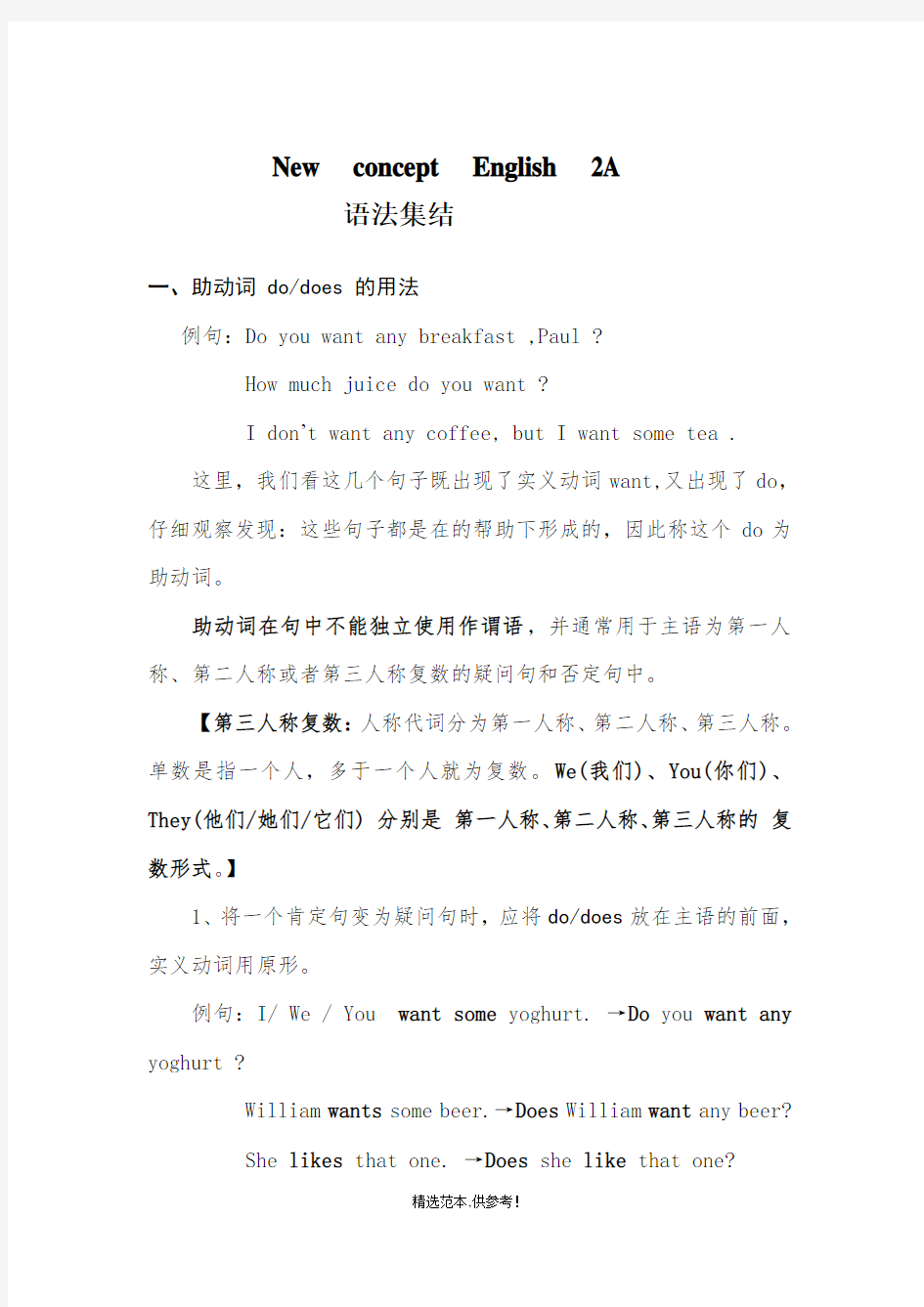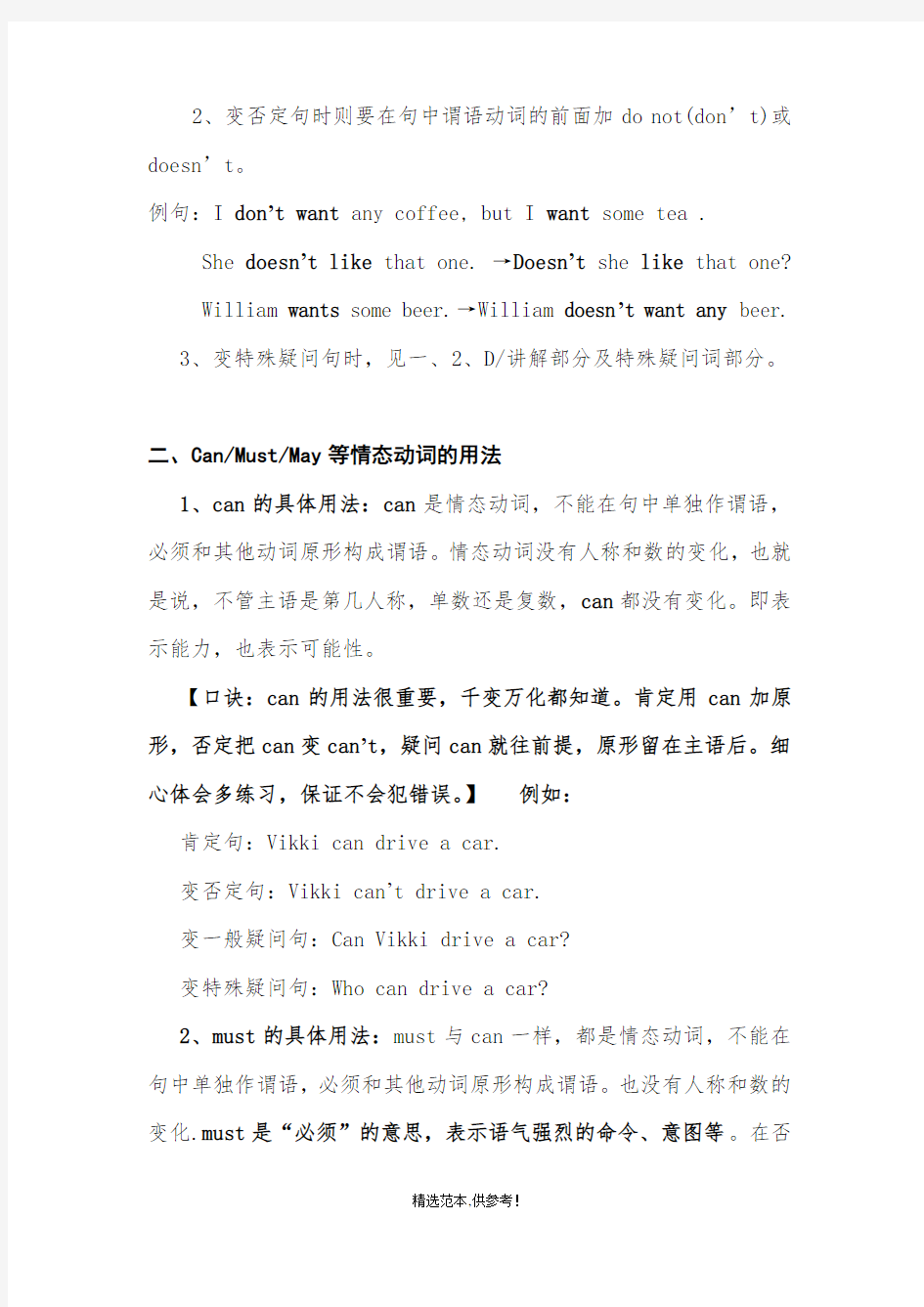

New concept English 2A
语法集结
一、助动词 do/does 的用法
例句:Do you want any breakfast ,Paul ?
How much juice do you want ?
I don’t want any coffee, but I want some tea .
这里,我们看这几个句子既出现了实义动词want,又出现了do,仔细观察发现:这些句子都是在的帮助下形成的,因此称这个do为助动词。
助动词在句中不能独立使用作谓语,并通常用于主语为第一人称、第二人称或者第三人称复数的疑问句和否定句中。
【第三人称复数:人称代词分为第一人称、第二人称、第三人称。单数是指一个人,多于一个人就为复数。We(我们)、You(你们)、They(他们/她们/它们) 分别是第一人称、第二人称、第三人称的复数形式。】
1、将一个肯定句变为疑问句时,应将do/does放在主语的前面,实义动词用原形。
例句:I/ We / You want some yoghurt. →Do you want any yoghurt ?
William wants some beer.→Does William want any beer?
She likes that one. →Does she like that one?
2、变否定句时则要在句中谓语动词的前面加do not(don’t)或doesn’t。
例句:I don’t want any coffee, but I want some tea .
She doesn’t like that one. →Doesn’t she like that one?
William wants some beer.→William doesn’t want any beer.
3、变特殊疑问句时,见一、2、D/讲解部分及特殊疑问词部分。
二、Can/Must/May等情态动词的用法
1、can的具体用法:can是情态动词,不能在句中单独作谓语,必须和其他动词原形构成谓语。情态动词没有人称和数的变化,也就是说,不管主语是第几人称,单数还是复数,can都没有变化。即表示能力,也表示可能性。
【口诀:can的用法很重要,千变万化都知道。肯定用can加原形,否定把can变can’t,疑问can就往前提,原形留在主语后。细心体会多练习,保证不会犯错误。】例如:
肯定句:Vikki can drive a car.
变否定句:Vikki can’t drive a car.
变一般疑问句:Can Vikki drive a car?
变特殊疑问句:Who can drive a car?
2、must的具体用法:must与can一样,都是情态动词,不能在句中单独作谓语,必须和其他动词原形构成谓语。也没有人称和数的变化.must是“必须”的意思,表示语气强烈的命令、意图等。在否
定句和疑问句的用法也与can一样。
You must eat.
Must you go now?
I can drink some water ,but I mustn’t eat.
3、can’t与mustn’t的区别:
can’t 意即“不能,不会”,表示不可能、无法;mustn’t而意为“禁止,不可以”,表示强烈的建议、意图和命令等,语气强硬。
4、may的具体用法:助词。
1) (表示可能性)可能,也许:She may be a nurse.
2)(表示许可或请求许可)可以:"May I come in?" "Yes, please."
3)(表示希望、祝愿等)祝,愿:May you succeed!
4) (表示目的)(以便)能,(使...)可以
They try to cure the disease so that people may live longer.
他们设法根治该病以便使人们活得更长些。
5) (用于问句中,表示不确定)会,究竟:
Who may the man be? 这个人会是谁呢?
6) 表示期望)能够,会:We hope she may win. 我们希望她会获胜。
三、have/has got的用法
在英语中通常用 have got代替 have,当主语为第三人称单数时,用has got 代替has,have got 或has got可以与前面的主语缩写为’ve 或‘s。
1)肯定式:We’ve (We have )got an English lesson today.
Lucy and Tom have got two chairs.
My parents have got a big house.
You have got everything. 你什么都有了。
He has got terrible toothache.
2):否定式:在have got 中,have 为助动词,在其后加否定词not, 就可以构成否定句。Have/Has not got=haven’t/has n’t got 如:They haven’t got computer lessons this week.
He hasn’t got a pencil.
My mother hasn’t got much money.
3)、一般疑问句及回答:只需将have或has提前到句首即可。回答时协助于助动词have或has.
如:Have you got a notebook?
---Yes, I have./No, I haven’t.
Have they got a library?
---Yes, they have./No, they haven’t.
Has Tom got stomach-ache?
---Yes, he has./No, he hasn’t.
4)、特殊问句:只需选用恰当的疑问词,再接正确的一般疑问句即可。How many rulers have they got?
When have they got this school?
What has he got ?
【特别提醒】:只能用have/has,不能用have /has got的情形。
◆在助动词或情态动词之后,不能用have /has got 。
He hasn’t got a computer.(T)
(F) He does n’t have got a computer.
He doesn’t have a computer.(T)
◆当have与动词转化而来的名词构成短语时,不能用have /has got 。 Have a look, have a break, have a drink
◆在一些固定搭配中,不能用have /has got 。
Have a good time, have breakfast, have lessons
四、some与any的用法:
1、some:一般用于肯定句中,意思是“几个、一些、某个”,作定语时可修饰可数名词或不可数名词。
如:I have some work to do today. (今天我有些事情要做) They will go there some day.(他们有朝一日会去那儿)
2、any:一般用于疑问句或否定句中,意思是“任何一些、任何一个”,作定语时可修饰可数或不可数名词。
如:They didn’t have any friends here.
Have you got any questions to ask?(你有问题要问吗?) 【注意】◆some 用于疑问句时,表示建议、请求或希望得到肯定回答。如:Would you like some coffee with sugar?你要加糖的咖啡吗?
◆any 用于肯定句时,意思是“任何的”。Come here with any
friend.随便带什么朋友来吧。
测试:1、I must eat some food.变否定句:
2、--I feel a bit hungry.
--Why don’t you have bread?
A. any
B. some
C. little
D. a
五、可数名词与不可数名词:
1、可数名词:普通名词所表示的人或事物是可以按个数计算的,这类名词叫可数名词。
可数名词分为个体名词(表示某类人或事物中的个体,如worker, farmer, desk, factory等)和集体名词(表示作为一个整体来看的一群人或一些事物,如people, family 等)。
可数名词有单数和复数两种形式。指一个人或一件事物时,用单数形式;指两个或多个人或事物时用复数形式。名词由单数形式变成复数形式的规则如下:
1). 一般的名词词尾直接加-s 。book → books
/room → rooms /house → houses / day → days
2). 以s, ss, ch, sh, x 结尾的名词,在词尾加-es 。如:
bus → buses /glass → glasses /watch → watches
dish → dishes /box → boxes
3). 以"辅音字母+y"结尾的名词,要先将y改为i再加-es。如:
city → cities /body → bodies /factory → factories